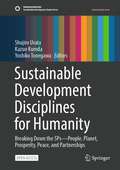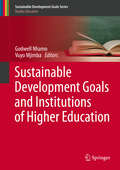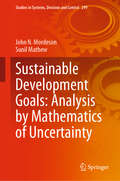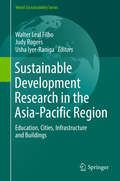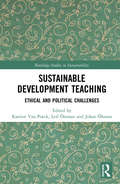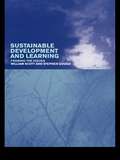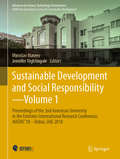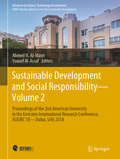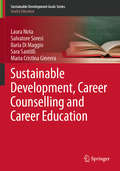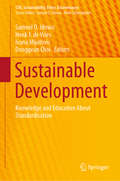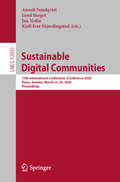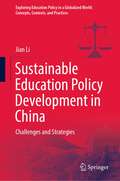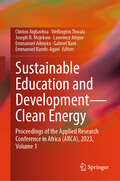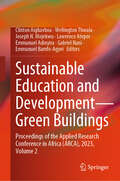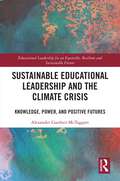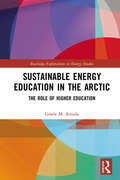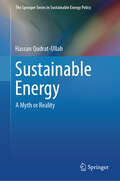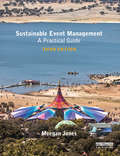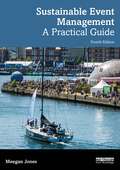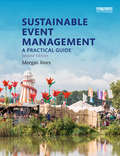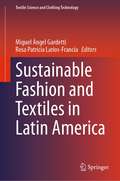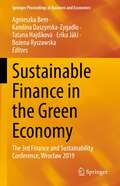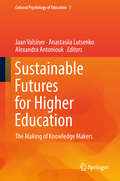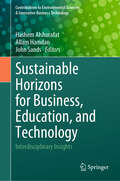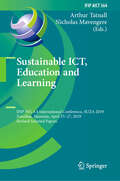- Table View
- List View
Sustainable Development Disciplines for Humanity: Breaking Down the 5Ps—People, Planet, Prosperity, Peace, and Partnerships (Sustainable Development Goals Series)
by Kazuo Kuroda Shujiro Urata Yoshiko TonegawaThis Open Access book provides eight problem solving lectures for sustainable development for people, peace, and partnerships. Those are three of the five keywords for the Sustainable Development Goals (SDGs): people, the planet, prosperity, peace, and partnerships or “the 5Ps”. Each of these lectures is classified into one of the keywords for SDGs and based on the history of social thought, human development, law, education, sociology, and peace studies. Further, each lecture delineates the essence of each discipline when it is practically applied to development studies. This book, Sustainable Development Disciplines for Humanity, along with its sister volume related to the planet and prosperity, Society, will be useful in studying development. Interdisciplinary research is necessary to achieve the SDGs advocated by the United Nations. Hence, it is essential to learn the basics of individual disciplines, as they each offer ample knowledge fostering problem solving through the accumulation of existing research. This and its sister volume are the first comprehensive textbooks summarizing the essence of each necessary discipline to approach development studies from an interdisciplinary perspective. In developing countries, this book will provide access to development research for readers aiming to further develop their own nations. Moreover, in developed countries, the book will provide access to problem-solving research for readers seeking holistic solutions to complex social problems.
Sustainable Development Goals and Institutions of Higher Education (Sustainable Development Goals Series)
by Godwell Nhamo Vuyo MjimbaThis volume brings together both theoretical and case study based contributions to the implementation of the Sustainable Development Goals (SDGs) in Institutions of Higher Education (IHE), presenting an impactful combination of authors from both developing and developed countries. While most current publications addressing the SDGs and education focus on sustainable development in general and specific topics such as climate change or energy, this book attempts to accelerate the localisation of the SDGs by presenting opportunities and innovations offered in various universities and campuses regarding SDGs localisation. The book seeks to provide an important contribution to the global dialogue on IHE and the SDGs, and will be of interest to academics and researchers engaged in the SDGs and education, as well as government agencies and other interested stakeholders. The book focuses on curriculum and learning matters, research and development as well as community engagement. Case studies detail the integration of SDGs in academic and professional development, new approaches to implementing sustainability science instruction, improvements in teaching practices to enhance teacher competence, and responsible management education. Additional focus is placed on the alignment of the SDGs in higher education with the other goals, emphasizing technological innovation for improved human health and environmental management, and climate change policies and action plans. Interdisciplinary solutions for pressing environmental problems are also provided, making sure that no one is left behind in realising these global development goals.
Sustainable Development Goals: Analysis by Mathematics of Uncertainty (Studies in Systems, Decision and Control #299)
by John N. Mordeson Sunil MathewThis book uses mathematics of uncertainty to examine how well countries are achieving the 17 Sustainable Development Goals (SDGs) set by the members of the United Nations, with a focus on climate change, human trafficking and modern slavery. Although this approach has never been used before, mathematics of uncertainty is well suited to exploring these topics due to the lack of accurate data available. The authors place several scientific studies in a mathematical setting to pave the way for future research on issues of sustainability, climate change, human trafficking and modern slavery to using a wide range of mathematical techniques. Moreover, the book ranks countries in terms of their achievement of not only the SDGs, but in particular those SDGs pertinent to climate change, human trafficking, and modern slavery, and highlights the deficiencies in the foster care system that lead to human trafficking. As such it is an excellent reference resource for advanced undergraduate and graduate students in mathematics and the social sciences, as well as for researchers and teachers.
Sustainable Development Research in the Asia-Pacific Region (World Sustainability Series)
by Walter Leal Filho Judy Rogers Usha Iyer-RanigaThis multidisciplinary book focuses on best practices in sustainability research in the Asia-Pacific Region. Drawing links between research, practice, education for sustainability and the needs of industry, it addresses the sustainable development goals (SDGs).The book also presents research undertaken by a wide range of universities on matters related to sustainable development, in order to promote research in this area across multiple disciplines. Four key themes are explored: (1) Education for Sustainability. (2) Sustainable Cities. (3) Sustainable Buildings. (4) Sustainable Infrastructure.This unique book documents and disseminates the wealth of know-how on sustainable development research in the Asia-Pacific Region today. It presents lessons learned and comparative case studies from various countries, including India, China, Indonesia, the Philippines, Bangladesh, New Zealand and Australia.
Sustainable Development Teaching: Ethical and Political Challenges (Routledge Studies in Sustainability)
by Leif Östman Katrien Van Poeck Johan ÖhmanThe aim of this book is to support and inspire teachers to contribute to much-needed processes of sustainable development and to develop teaching practices and professional identities that allow them to cope with the specificity of sustainability issues and, in particular, with the teaching challenges related to the ethical and political dimension of environmental and sustainability education. Bringing together recent scholarship on the topic, this book translates state-of-the-art academic research into teaching models, methods and tools. Starting with an outline of the challenge of sustainability, it offers insights and models for understanding the interesting yet ambiguous concept of ‘sustainable development’ and the complex process of transforming society in a more sustainable direction (Part I). It then goes on to provide a guide to preparing courses and lessons as well as tools for reflection about teaching practices and the multiplicity of approaches to addressing ethical and political challenges in sustainable development teaching (Part II). Finally, the book offers useful conceptual frameworks, models and typologies about the concrete design and implementation of sustainable development teaching (Part III). This book will be essential reading for students of education, as well as teachers in compulsory and higher education and sustainability education researchers.
Sustainable Development and Learning: Framing The Issues
by William Scott Stephen GoughThis book examines the difficult and wide-ranging issues relating to how we understand our environment, our place in it, and how we choose to act. This comprehensive text provides an overview of these developing key issues, illustrating how - through schooling, higher education, professional training and development, and awareness-raising - people can bring about change, as well as engaging in debate and critique of issues. The book builds on existing work across a number of fields, as well as on original international research, in order to model the complexity of the problems, the institutional contexts in which they arise, and the interrelationships between these. Areas explored include the policy context, the links between sustainable development and learning, the economic and moral interdependence of humans and nature, the management, assessment and evaluation of learning, and globalisation. The book suggests ways in which those responsible for learning can target their efforts appropriately, matching straightforward solutions to simple problems, and designing complex interventions only where these are needed. This text will be a valuable resource for anyone studying Masters degrees and MBAs that focus on environment or sustainable development, and for professionals dealing with problems on a day-to-day basis. Though a free-standing text, its analysis is supported by a companion reader: Key Issues in Sustainable Development and Learning: a critical review.
Sustainable Development and Social Responsibility—Volume 1: Proceedings of the 2nd American University in the Emirates International Research Conference, AUEIRC'18 – Dubai, UAE 2018 (Advances in Science, Technology & Innovation)
by Miroslav Mateev Jennifer NightingaleThe book presents high-quality research papers presented at the 2nd American University in the Emirates International research conference, AUEIRC'18, organized by the American University in the Emirates, Dubai, held on November 13th-15th, 2018. The book is broadly divided into four sections: Sustainability and Smart Technology, Sustainability and Social Responsibility, Sustainability, Human Security and Legislation, Sustainability and Education. The topics covered under these sections are sustainable smart technology such as developing green curriculum for information technology, use ultrasonic velocity to predict quality of wheat, improve security features for visa system, factors affecting the cost of production of electricity and desalination plants, impact of smart traffic sensing in smart cities, smart healthcare system, simulation of Grey wolf optimization algorithm in painting digital forensics. The topics covered for sustainability and creative industries such as sustainable concrete production, multimedia applications in digital transformation art, integrating biomimicry principles in sustainable architecture. Sustainability, human security and legislation covered topics of urban performance and sustainable environment, Eco-certification as response on climate change, the criminal offence of tax evasion in law: case study, skills engineering in sustainable counter defense against Cyber extremism, the international law and challenges of trans-boundary water resources governance, the legal status of nuclear energy: case study, sustainable energy development and nuclear energy legislation in UAE, corruption specific safety challenge, environmental management and sustainability, sustainable farming models for desert agro-ecosystems, future directions of climate change, earth and built environment towards new concept of sustainability, institution building from emotional intelligence perspective, virtue ethics, technology and sustainability, the role of humor in a sustainable education, HEIs practices and strategic decisions toward planning for sustainable education programs, TQM in higher education for sustainable future. The papers in this book present high-quality original research work, findings and practical development experiences.
Sustainable Development and Social Responsibility—Volume 2: Proceedings of the 2nd American University in the Emirates International Research Conference, AUEIRC'18—Dubai, UAE 2018 (Advances in Science, Technology & Innovation)
by Ahmed N. Al-Masri Yousef Al-AssafThis book gathers high-quality research papers presented at the 2nd AUE international research conference, AUEIRC 2018, which was organized by the American University in the Emirates, Dubai, and held on November 13th-15th, 2018. The book is broadly divided into two main sections: Sustainability and Smart Business, and Sustainability and Creative Industries. The broad range of topics covered under these sections includes: risk assessment in agriculture, corporate social responsibility and the role of intermediaries, the impact of privatizing health insurance, political events and their effect on foreign currency exchange, the effect of sustainable HR practices on financial performance, sustainability integration in the supply chain and logistics, gender inequality in the MENA economies, the panel data model, the model of sustainable marketing in the era of Industry 4.0, micro-enterprises as a tool for combating unemployment, the impact of financial education and control on financial behavior, measuring financial and asset performance in agricultural firms, a comprehensive strategic approach to sustainability in the UAE, sustainability and project finance, HR analytics, FaD or fashion for organizational sustainability, a conceptual framework of sustainable competitive advantages, psychology of organizational sustainability, Blockchain technology and sustainability, veganism and sustainability, institution building from an emotional intelligence perspective, sustainable concrete production using CWP, occupants’ behavior and energy usage in Emirati houses, the effect of shop lighting on consumer behavior, multimedia applications in digital transformation art, integrating biomimicry principles in sustainable architecture, experimental sustainable practices in fashion education, technology-assisted student-centered learning for civil engineering, and a 10-step design process for architectural design studios. All contributions present high-quality original research work, findings and lessons learned in practical development.
Sustainable Development, Career Counselling and Career Education (Sustainable Development Goals Series)
by Laura Nota Salvatore Soresi Ilaria Di Maggio Sara Santilli Maria Cristina GinevraThis book is based on the Life Design paradigm and discusses the efforts made to overcome the matching paradigm between individuals and their work contexts, in order to guarantee the adoption of an active role for future career planning. Starting from the evolution of career counselling and vocational guidance in the 20th century and then following the more updated reflections in the Life Design paradigm, this book discusses research results from the Larios Laboratory (Padova, Italy) in collaboration with numerous international colleagues and institutions. These results show that career counselling and vocational designing can not only help people to plan their future in agentive ways, but also to help them getting out of the ‘mists of the present’ and to project themselves into a future that is yet to be created. This future is aligned by the world of research and international institutions, such as the UN and WHO, and follows the 2030 Agenda for Sustainable Development, with particular attention to Sustainable Development Goals 4, 8 and 12. This book reveals how trajectories can be created from one’s own mission, realized with the help of others and newly acquired strengths. It shows how career counselling and vocational designing can help people to build their own future from an inclusive and sustainable perspective, based on social justice, and to help build a better future for all.
Sustainable Development: Knowledge and Education About Standardisation (CSR, Sustainability, Ethics & Governance)
by Samuel O. Idowu Henk J. de Vries Ivana Mijatovic Donggeun ChoiThis book examines education about standardization in the context of sustainable management. It shows the role of standardization education in the global economy, and in markets, industries and businesses. The book presents knowledge on standardization for sustainable management, describes measures that can be taken to stimulate it, and highlights strategies for teaching and disseminating the concept. Subsequently presenting a number of best practices and case studies, the book seeks to align theory and practice. For researchers, this is the first academic publication that interconnects the concepts of sustainability, standardization and education. For professionals in the area of sustainability it shows that standardization is an essential instrument for enhancing sustainability for which proper education is needed. For standardization professionals the book reveals the links to sustainability and it shows not only the importance of education about standardization but also how this can be organized, and finally, for universities, the book shows that standardization deserves to be included in the curriculum, and it provides guidance and best practice examples about how this can be done.
Sustainable Digital Communities: 15th International Conference, iConference 2020, Boras, Sweden, March 23–26, 2020, Proceedings (Lecture Notes in Computer Science #12051)
by Anneli Sundqvist Gerd Berget Jan Nolin Kjell Ivar SkjerdingstadThis volume constitutes the proceedings of the 15th International Conference on Sustainable Digital Communities, iConference 2020, held in Boras, Sweden, in March 2020. The 27 full papers and the 48 short papers presented in this volume were carefully reviewed and selected from 178 submissions. They cover topics such as: sustainable communities; social media; information behavior; information literacy; user experience; inclusion; education; public libraries; archives and records; future of work; open data; scientometrics; AI and machine learning; methodological innovation.
Sustainable Education Policy Development in China: Challenges and Strategies (Exploring Education Policy in a Globalized World: Concepts, Contexts, and Practices)
by Jian LiThis book investigates the sustainable education policy development in China in the aspects of challenges and strategies. In this book, the conceptual model of the sustainable education policy development in China is divided into several parts, including the sustainable development of preschool education, the sustainable development of ethnic education, the sustainable development of vocational education, the sustainable development of higher education, and the sustainable development of lifelong learning. This book serves as a reference for scholars and researchers who are interested and work in research on China’s sustainable education policy development, administrators, and stakeholders in China's education system and graduate students who major or minor in the field of comparative and international education.
Sustainable Education and Development—Clean Energy: Proceedings of the Applied Research Conference in Africa (ARCA), 2023, Volume 1
by Clinton Aigbavboa Wellington Thwala Joseph N. Mojekwu Lawrence Atepor Emmanuel Bamfo-Agyei Emmanuel Adinyira Gabriel NaniThis book is Volume 1 of the proceedings of 2023 Sustainable Education and Development Research Conference. This volume concentrates on papers in the area of clean energy. Despite considerable progress, more than 700 million people worldwide still lack access to electricity, and around 2.4 billion people continue to use harmful and polluting fuels for cooking. While efforts have been made to promote renewable energy and energy efficiency, they have not been fast enough to achieve Sustainable Development Goal 7. Adding to the challenge, the ongoing war in Ukraine has contributed to rising global energy prices and heightened energy insecurity in Europe. In response to the energy crisis, some European countries are planning to accelerate the transition to renewables and increase investments in clean energy and energy efficiency. However, others are considering a resurgence of coal, which poses a risk to the overall green transition. Between 2010 and 2020, the percentage of the global population with access to electricity increased from 83% to 91%, with 1.3 billion people gaining access. Nevertheless, this leaves approximately 733 million people still without electricity, and most of them reside in sub-Saharan Africa. Achieving universal access by 2030, the annual growth rate in access needs to accelerate from 0.5 percentage points to 0.9 percentage points, necessitating significant efforts in low-income, fragile, and conflict-affected countries. In 2020, 69% of the global population had access to clean cooking fuels and technologies. While more than half of those without access to clean cooking fuels live in Asia, the 20 countries with the lowest percentage of people having access to clean cooking were predominantly least developed countries in Africa. The share of renewable sources in total final energy consumption reached 17.7% globally in 2019, just slightly higher than the figure for 2015. The electricity sector leads in the adoption of renewables, accounting for 26.2% of total final energy consumption in 2019, while the heat and transport sectors have made limited progress. Global primary energy intensity, defined as global total energy supply per unit of GDP, improved from 5.6 megajoules per dollar (2017 purchasing power parity) in 2010 to 4.7 megajoules in 2019. However, the rate of improvement (1.6% per year on average since 2015) falls short of the 3.2% annual rate needed to reach Sustainable Development Goal 7.3. International financial flows to support clean and renewable energy in developing countries reached $10.9 billion in 2019, a 23.6% decrease from 2018. This decline occurred even before the onset of the COVID-19 pandemic. Over a longer five-year moving average, average annual commitments decreased for the first time since 2008, from $17.5 billion in 2014-18 to $16.6 billion in 2015-19. Although developing countries achieved a record of 245.7 watts per capita in installed renewable energy-generating capacity in 2020, small island developing States, least developed countries, and landlocked developing countries have lagged behind. It would take least developed countries and landlocked developing countries nearly 40 years and small island developing States almost 15 years to reach the same level of progress as the average developing country in 2020. The 2023 SEDRC conference, titled "Sustainable Development and Education," aims to redefine the understanding of research in the continent's development and the role of researchers. The conference focusses on applied research discussions and its dissemination. Researchers from research institutions, academicians, postgraduate students, politicians, and industry representatives will be the primary audience for the conference proceedings.
Sustainable Education and Development—Green Buildings: Proceedings of the Applied Research Conference in Africa (ARCA), 2023, Volume 2
by Clinton Aigbavboa Wellington Thwala Joseph N. Mojekwu Lawrence Atepor Emmanuel Bamfo-Agyei Emmanuel Adinyira Gabriel NaniThis book is Volume 2 of the proceedings of 2023 Sustainable Education and Development Research Conference. This volume concentrates on papers in the area of green buildings. Despite considerable progress, more than 700 million people worldwide still lack access to electricity, and around 2.4 billion people continue to use harmful and polluting fuels for cooking. While efforts have been made to promote renewable energy and energy efficiency, they have not been fast enough to achieve Sustainable Development Goal 7. Adding to the challenge, the ongoing war in Ukraine has contributed to rising global energy prices and heightened energy insecurity in Europe. In response to the energy crisis, some European countries are planning to accelerate the transition to renewables and increase investments in clean energy and energy efficiency. However, others are considering a resurgence of coal, which poses a risk to the overall green transition. Between 2010 and 2020, the percentage of the global population with access to electricity increased from 83% to 91%, with 1.3 billion people gaining access. Nevertheless, this leaves approximately 733 million people still without electricity, and most of them reside in sub-Saharan Africa. Achieving universal access by 2030, the annual growth rate in access needs to accelerate from 0.5 percentage points to 0.9 percentage points, necessitating significant efforts in low-income, fragile, and conflict-affected countries. In 2020, 69% of the global population had access to clean cooking fuels and technologies. While more than half of those without access to clean cooking fuels live in Asia, the 20 countries with the lowest percentage of people having access to clean cooking were predominantly least developed countries in Africa. The share of renewable sources in total final energy consumption reached 17.7% globally in 2019, just slightly higher than the figure for 2015. The electricity sector leads in the adoption of renewables, accounting for 26.2% of total final energy consumption in 2019, while the heat and transport sectors have made limited progress. Global primary energy intensity, defined as global total energy supply per unit of GDP, improved from 5.6 megajoules per dollar (2017 purchasing power parity) in 2010 to 4.7 megajoules in 2019. However, the rate of improvement (1.6% per year on average since 2015) falls short of the 3.2% annual rate needed to reach Sustainable Development Goal 7.3. International financial flows to support clean and renewable energy in developing countries reached $10.9 billion in 2019, a 23.6% decrease from 2018. This decline occurred even before the onset of the COVID-19 pandemic. Over a longer five-year moving average, average annual commitments decreased for the first time since 2008, from $17.5 billion in 2014-18 to $16.6 billion in 2015-19. Although developing countries achieved a record of 245.7 watts per capita in installed renewable energy-generating capacity in 2020, small island developing States, least developed countries, and landlocked developing countries have lagged behind. It would take least developed countries and landlocked developing countries nearly 40 years and small island developing States almost 15 years to reach the same level of progress as the average developing country in 2020. The 2023 SEDRC conference, titled "Sustainable Development and Education," aims to redefine the understanding of research in the continent's development and the role of researchers. The conference focusses on applied research discussions and its dissemination. Researchers from research institutions, academicians, postgraduate students, politicians, and industry representatives will be the primary audience for the conference proceedings.
Sustainable Educational Leadership and the Climate Crisis: Knowledge, Power, and Positive Futures (Educational Leadership for an Equitable, Resilient and Sustainable Future)
by Alexander Gardner-McTaggartChallenging conventional leadership models, this timely and pioneering volume offers a critical rethinking of educational leadership in the context of global crises, particularly climate change and social inequality.Chapters introduce transformative approaches that prioritise sustainability, social justice, and collaboration by critically examining historical and philosophical foundations of current educational leadership through a blend of scholarly analysis and practical insights. Qualitative international data used in this book lend insight into educators’ lived perspectives. This book introduces thinkers such as Habermas, Serres, Foucault, Heidegger, and Anders on knowledge generation as applied to educational leadership. This book challenges neoliberal and patriarchal models of leadership that dominate the field. It offers innovative frameworks, such as degrowth and political ecology, to address the pressing issues of climate change and social inequality.Ultimately, this book champions critical thinking as a tool for leadership and a resource for leading, and will be of use to researchers, scholars, and postgraduate students interested in leadership strategy, sustainability education, training, and leadership, and the theory of education more broadly. Those involved with higher education management and philosophy of education will also find this book of value.
Sustainable Energy Education in the Arctic: The Role of Higher Education (Routledge Explorations in Energy Studies)
by Gisele M. ArrudaThis book examines the nature of the ‘energy curriculum’ in Arctic Higher Education and provides invaluable data and new models to assess levels of Sustainable Development Literacy. Drawing on course mapping conducted in Higher Education institutions across the Arctic, Arruda looks at the nature, structure, and design of the Arctic Higher Education curriculum in order to assess levels of Sustainable Development Literacy and considers the extent to which Arctic Higher Education courses align to UNESCO Education for Sustainable Development (ESD). Using data from four key case studies in Norway, Canada, and the US, and applying a framework drawn from different knowledge systems (Traditional Knowledge and Western educational system), she analyses the different educational approaches and pedagogies used and specifically considers how Higher Education in this region can contribute to the accomplishment of Sustainable Development and the Sustainable Development Goals. The book concludes by proposing new models to assess Higher Education adherence to ESD and outlines how a culturally inclusive curriculum can invite different groups of people to engage in a meaningful Sustainable Development debate, learning experience, and knowledge application. This innovative volume will be of great interest to multicultural students, scholars, and educators of Sustainable Development, climate change, energy, Arctic studies, and global Higher Education across the Arctic and non-Arctic nations.
Sustainable Energy: A Myth or Reality (The Springer Series in Sustainable Energy Policy)
by Hassan Qudrat-UllahThis book embarks on a transformative journey through the complex landscape of renewable energy, challenging prevailing myths and uncovering the realities that define our energy future. At the heart of this exploration lies the dynamic intersection of technology and sustainability, spotlighting the critical nexus where innovation meets eco-conscious solutions. Far from a mere debunking exercise, this book unfolds as a comprehensive narrative, weaving through the complex tapestry of challenges and opportunities that define the sustainable energy paradigm. Unravelling misconceptions surrounding sustainable energy, the book places a particular emphasis on renewable sources like solar and wind, providing a profound understanding that extends beyond the surface. Engaging case studies and examples punctuate the narrative, offering a firsthand glimpse into the practical applications and challenges of sustainable energy projects. Designed for a diverse readership, the book speaks to: (i) Students and teachers: Delving into the scientific and technical intricacies of sustainable energy sources, along with their broader environmental, social, and economic impacts. (ii) Researchers and professionals: Offering an up-to-the-minute guide to the latest developments and trends in the ever-evolving field of sustainable energy. (iii) Policy makers and activists: Providing a nuanced exploration of the facts and evidence underpinning sustainable energy, alongside an insightful examination of the myths and misconceptions that surround it. (iv) General readers: Inviting all who seek to broaden their knowledge and awareness of sustainable energy, understanding its profound relevance and importance for the collective future of humanity and the planet. This book isn't just a journey; it's a call to action. As you turn the pages, you're not only gaining knowledge but becoming part of a movement toward a resilient and eco-friendly tomorrow. Embrace the future of energy – informed, inspired, and empowered.
Sustainable Event Management: A Practical Guide
by Meegan JonesAcross the world each year events of every shape and size are held: from community events, school fairs and local business functions through to the world’s largest festivals, music events, conferences and sporting events. As well as causing celebration and giving voice to issues, these public parties use up resources, send out emissions and generate mountains of waste. Events also have the power to show sustainability in action and every sustainably produced event can inspire and motivate others to action. Written by a leader in event sustainability management, this book is a practical, step-by-step guide taking readers through the key aspects of how to identify, evaluate and manage event sustainability issues and impacts and to use the event for good – it's for events of any style and scale, anywhere in the world. Now in its third edition, this is the indispensable one-stop guide for event professionals and event management students who want to adjust their thinking and planning decisions towards sustainability, and who need a powerful, easy-to-use collection of tools to deliver events sustainably.
Sustainable Event Management: A Practical Guide
by Meegan JonesWritten by a leader in event sustainability management, this book is a practical, step-by-step guide taking readers through the key aspects of how to identify, evaluate, and manage event sustainability issues and impacts and to use the event for good – events of any style and scale, anywhere in the world.Each year events of every shape and size are held globally: from community events, school fairs, and local business functions through to the largest festivals, music concerts, conferences, and sporting events. As well as encouraging celebration and giving voice to issues, these public parties can use up resources, send out emissions, and generate mountains of waste. But events also have the power to showcase sustainability in action, and every sustainably produced event can inspire and motivate others to action. Thoroughly updated in its fourth edition, this book reflects what event sustainability best practice looks like in this new era of the discipline: circular and net zero, reusables and renewable energy, climate conscious catering – stakeholders expect it and the solutions now exist. The new edition also features additional case studies, and an updated look at greenhouse gas emissions measurement, providing readers with practical guidance on how to manage events responsibly.This is the indispensable one-stop guide for event professionals and event management students who want to keep up with industry best practices and who need a powerful, easy-to-use collection of tools to deliver events sustainably.
Sustainable Event Management: A Practical Guide
by Meegan Lesley JonesGatherings of people for a purpose always have and always will be a part of the human story. Those staging these events have a social and environmental responsibility to manage their impacts and enhance their positive lasting legacies. Written by a leader in the field, this book is a practical, step-by-step guide taking readers through the key aspects of how to identify, evaluate and manage event sustainability issues and impacts - for events of any style and scale, anywhere in the world. The product of tried-and-tested methods, coverage includes numerous examples and case studies from across the world, such as Boom (Portugal), Bonnaroo (USA), Hurricane (Germany), and Glastonbury (UK) Festivals. Readers are provided with checklists for action and tools for measuring performance. This updated second edition includes a detailed review of the new international standard ISO 20121 Event Sustainability Management Systems along with other recent standards and certifications. It expands detail on measuring and reporting event sustainability performance outcomes with explanation of the Global Reporting Initiative Event Organizers Sector Supplement performance indicators. This is the indispensable one-stop guide for event professionals and event management students who want to adjust their thinking and planning decisions towards sustainability, and who need a powerful, easy to use collection of tools to deliver events sustainably.
Sustainable Fashion and Textiles in Latin America (Textile Science and Clothing Technology)
by Miguel Ángel Gardetti Rosa Patricia Larios-FranciaThis book highlights the sustainable aspects of fashion and textiles in Latin America and discusses how the manufacturing and consumption of textile products and fashion are significant sources of environmental damage. It addresses important issues of water and energy consumption in the textile and fashion industry and using case studies presents how social responsibilities in consumer behavior can help in minimizing these environmental issues for a better future.
Sustainable Finance in the Green Economy: The 3rd Finance and Sustainability Conference, Wrocław 2019 (Springer Proceedings in Business and Economics)
by Agnieszka Bem Bożena Ryszawska Erika Jáki Karolina Daszynska-Zygadlo Tatana HajdíkováThis book explores issues related to green and sustainable finance which aims at the transformation of economies into a new, more sustainable model. It covers a variety of issues related to various financial areas, such as: corporate finance, public finance, monetary and fiscal policy, and risk management. The enclosed papers reflect the extent, diversity, and richness of research areas in the finance and sustainability fields, both fundamental and applied, and are beneficial to researchers, practitioners, scholars and policy makers in economics, finance, and international economics.
Sustainable Futures for Higher Education: The Making of Knowledge Makers (Cultural Psychology of Education #7)
by Jaan Valsiner Anastasiia Lutsenko Alexandra AntonioukThis volume addresses the current situation in higher education and what creative action needs to be taken for the future development of the various systems of higher education. Higher education in the 21st centuries is under immense pressure from various sides. First, there is dramatic limitation of funding from public sources and limited and selective funding support from private sources that is re-constructing the landscape of higher education in most societies around the World. Secondly there is the continuous stream of administrative re-organization efforts of political origins (e.g. “the Bologna process”) that guide the advancement of higher education in our present time. Increasing privatization of all forms of higher education—from bachelor to doctoral levels—and its corresponding focus on the advancement of the kind of knowledge that has immediate applicability in various spheres of societies leads to the question- what kind of creativity is expected from the new cohorts of students—future makers of knowledge—once the current social re-organization of higher education systems becomes fully established. To address these questions the international, interdisciplinary cast of authors in this volume provides a multitude of possible scenarios for future development of the systems of higher education. This book on “Sustainable Futures of Higher Education” captures the current trends and perspectives of the Knowledge Makers from various nations of the world on meeting and greeting the challenges of globalization and the pressures of the knowledge economy. It makes a strong case for universities of tomorrow sustaining their autonomous thinking and yet nurturing an environment of collaborative partnership with society, corporate and industry to fuel innovations in plenty and continuous supply of new science and technologies. Higher Education has been and shall remain a powerful vehicle of national and global transformation. I see a great value of the publication in impacting the minds of the leaders in higher education around the globe for revitalizing the universities.Professor P. B Sharma, President of Association of Indian Universities, AIU How should the higher education system be in the globalization era? In this book Jaan Valsiner and his colleagues analyze, criticize the existing and propose a new higher education system. When we say "higher education”, three different layers are supposed to be there-- the lower, the middle and the higher. The latter has the function of production of new knowledges. Without new knowledge, our societies are never improving. Authors warn commercialized systems such as the “Bologna system” overestimate the homogeneity of education. ““Universities without Borders” would guarantee both diversity and innovation in the higher education systems.Professor Tatsuya Sato, Dean of Research, Ritsumekan University
Sustainable Horizons for Business, Education, and Technology: Interdisciplinary Insights (Contributions to Environmental Sciences & Innovative Business Technology)
by Allam Hamdan Hashem Alshurafat John SandsThis book offers a detailed analysis of the intersection of sustainability, innovation, and global progress, and it comprehensively explores sustainable practices and their impact on business, education, and technology. The book shows how businesses can incorporate sustainability into their core operations, including environment-friendly supply chains, renewable energy adoption, circular economy models, ethical decision-making, and sustainable growth strategies. Successful sustainable businesses and the benefits of their socially responsible practices are highlighted. In addition, the book explores how education can shape a sustainable future. It is necessary to integrate the ideas of sustainability into the curricula of early childhood education to higher learning institutions to educate and empower the next generation of changemakers. The role of technology in advancing sustainability efforts is also investigated, including artificial intelligence, blockchain, clean energy solutions, green architecture, and smart cities. Other topics explored in the book include global sustainability efforts such as international collaborations, public-private partnerships, and multilateral initiatives; the role of governments, NGOs, and international organizations in promoting sustainable development; ethical considerations and social impacts of sustainable practices, for example, social justice, inclusivity, and environmental stewardship; connections between sustainable development and improved quality of life; and groundbreaking ideas and innovations for industries to tackle sustainability issues. The book offers a comprehensive and forward-looking perspective on sustainability. By combining different viewpoints, the book empowers readers with the knowledge and inspiration to contribute meaningfully to a more sustainable, inclusive, and resilient world.
Sustainable ICT, Education and Learning: IFIP WG 3.4 International Conference, SUZA 2019, Zanzibar, Tanzania, April 25–27, 2019, Revised Selected Papers (IFIP Advances in Information and Communication Technology #564)
by Arthur Tatnall Nicholas MavengereThis book constitutes the refereed post-conference proceedings of the First IFIP WG 3.4 International Conference on Sustainable ICT, Education, and Learning, SUZA 2019, held in Zanzibar, Tanzania, in April 2019, in conjunction with the 15th IFIP WG 9.4 International Conference on Social Implications of Computers in Developing Countries.The 27 revised full papers presented in this volume were carefully reviewed and selected from 41 submissions. The papers cover topics such as peer and collaborative learning in informatics; pedagogical approaches to teaching specific informatics courses; workplace learning related to information systems; e-learning; ICTs for development; mobile solutions in learning in the North and South; lifelong learning; applications for disabled students; traversal skills and computational thinking; and teacher education in the global South.
